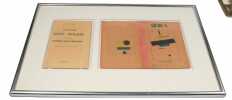"MALEVICH, KASIMIR (+) PUNIN, NIKOLAI.
Pervyi tsikl lektsii, chitannykh na kratkosrochnykh kursakh dlya uchitelei risovaniya: Sovremennoye iskusstvo [i.e. ""First Cycle of Lectures given for Short Courses for Teachers of Drawing: Contemporary Art]. - [ONLY COLOUR LITHOGRAPH BY MALEVICH]
Petrograd, 17-ya Gos. tip., 1920. 8vo. Original printed wrappers with a color lithograph by Malevich on each wrapper. Wrapper detached and bookblock and wrappers displayed, seperatly, in a frame. Spine restored, wrappers slightly faded, otherwise a good copy. 84 pp.
Reference : 61326
First edition of this influential work by Punin with Malevich’s famous ‘Suprematist’ wrappers, being the only color lithographs by Malevich. Punin was twice arrested for anti-Soviet activities and finally sent to Siberia where he died. Kazimir Malevich (1878-1935) famously declared in the catalog for the Tenth State Exhibition in 1917: “I have shattered the blue shade of color boundaries and emerged into white. Behind me, comrade pilots float in the whiteness. I have established the semaphore of Suprematism.” However, Nikolai Punin did not view Malevich's Suprematism as a new foundation for national artistic tradition, finding it too individualistic for such a purpose. Despite this Punin remained intrigued by Malevich's work, a fact emphasized by Malevich designing the cover of this book. Nikolai Nikolaevich Punin (1888-1935), a Russian art scholar and writer, was part of a circle that included figures like Mayakovsky, Malevich, Tatlin, and Lebedev. Renowned for his captivating lectures, Punin drew large audiences of progressive-minded individuals from Soviet Academia and his numerous students. ""During the 1920s he [Punin] was one of the most widely read of Russian writers on art. He believed that modern art criticism should be scientific and even tried to reduce the creative process to a mathematical formula: S(Pi + Pii + Piii…)Y = T, where S is the sum of the principles (P), Y is intuition, and T is artistic creation. It is therefore not surprising that Punin preferred the ‘engineer’ Tatlin to the artist Malevich, concluding that Malevich was too subjective to examine material in a scientific and impartial manner. Even so, Punin was a keen supporter of many different members of the Russian avant-garde. He also did valuable research on earlier Russian art. His formalist views were opposed to the ideals of Socialist Realism demanded by Stalin, and after the Second World War he was one of a number of critics who were persecuted for their ‘cosmopolitan’ views (the campaign against them was led by Alexander Gerasimov). In 1949 Punin was arrested and sent to a prison camp in Siberia, where he died."" (Oxford Dictionary).
Bookseller's contact details
Herman H. J. Lynge & Son
William Schneider
Silkegade 11
1113 Copenhagen
Denmark
+45 33 155 335
Payment mode
Sale conditions
All items may be returned for a full refund for any reason within 14 days of receipt.
 Write to the booksellers
Write to the booksellers


